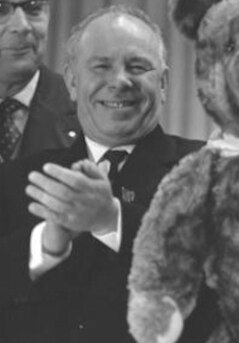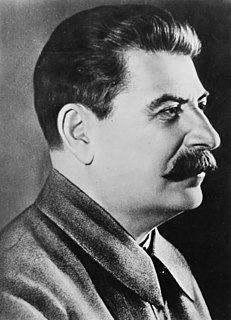Related Research Articles

Nikolai Viktorovich Podgorny was a Soviet statesman who served as the Chairman of the Presidium of the Supreme Soviet, the head of state of the Soviet Union, from 1965 to 1977.

Alexei Nikolayevich Kosygin was a Soviet statesman during the Cold War. He served as the Premier of the Soviet Union from 1964 to 1980 and was one of the most influential Soviet policymakers in the mid-1960s along with General Secretary Leonid Brezhnev.

The Ministry of Justice of the Union of Soviet Socialist Republics (USSR), formed on 15 March 1946, was one of the most important government offices in the Soviet Union. It was formerly known as the People's Commissariat for Justice abbreviated as Наркомюст (Narkomiust). The Ministry, at the All-Union (USSR-wide) level, was established on 6 July 1923, after the signing of the Treaty on the Creation of the USSR, and was in turn based upon the People's Commissariat for Justice of the Russian Soviet Federative Socialist Republic (RSFSR) formed in 1917. The Ministry was led by the Minister of Justice, prior to 1946 a Commissar, who was nominated by the Chairman of the Council of Ministers and confirmed by the Presidium of the Supreme Soviet, and was a member of the Council of Ministers.
The former government of Nikita Khrushchev was dissolved following his removal from the post of the Chairman of the Council of Ministers. Alexei Kosygin was elected Premier by the Politburo and the Central Committee following the removal of Khrushchev. His first government would last for two years, until the 1966 Soviet election held in June. Kosygin's first government saw the re-creation of many ministries that were removed under Khrushchev's previous government.
The former government of Alexei Kosygin was dissolved following the Soviet legislative election of 1970. Kosygin was once again elected Premier by the Politburo and the Central Committee following the election. His third government would last for four years, until the 1974 Soviet election.

The former government of Nikita Khrushchev was dissolved following the Soviet election of 1962.
The former government of Alexei Kosygin was dissolved following the Soviet legislative election of 1974. Kosygin was once again elected premier by the Politburo and the Central Committee following the election. His fourth government lasted for nearly five years, until the 1979 Soviet election.
The former government of Alexei Kosygin was dissolved following the Soviet legislative election of 1979. Kosygin was once again elected Premier by the Politburo and the Central Committee following the election. His fourth government lasted a little over one year due to bad health which led him to resign.
The former government of Alexei Kosygin was dissolved following his resignation in October 1980. Nikolai Tikhonov took over the office of the Premier. The government was dissolved following the nationwide 1984 legislative election.
The former government of Nikolai Tikhonov was dissolved following the Soviet legislative election of 1984 which gave a clear majority in favour of the Communist Party of the Soviet Union. Tikhonov's government was dissolved in 1985 when Mikhail Gorbachev replaced him with Nikolai Ryzhkov as Premier.
The history of the Soviet Union from 1964 to 1982, referred to as the Brezhnev Era, covers the period of Leonid Brezhnev's rule of the Union of Soviet Socialist Republics (USSR). This period began with high economic growth and soaring prosperity, but gradually significant problems in social, political, and economic areas accumulated, so that the period is often described as the Era of Stagnation. In the 1970s, both sides took a stance of "detente". The goal of this strategy was to warm up relations, in the hope that the Soviet Union would pursue economic and democratic reforms. However, this did not come until Mikhail Gorbachev took office in 1985.

The Soviet Union–Pakistan relations refers to historical, political, international, and cultural relationships between the state of Pakistan and the Union of Soviet Socialist Republics (USSR). Establishing cultural and bilateral connections between Moscow and Karachi on May 1, 1948, the relations were succeed and predate the post-Soviet Russo-Pakistan relations (1991–present).

The history of Soviet Russia and the Soviet Union (USSR) reflects a period of change for both Russia and the world. Though the terms "Soviet Russia" and "Soviet Union" often are synonymous in everyday speech, when referring to the foundations of the Soviet Union, "Soviet Russia" often specifically refers to brief period between the October Revolution of 1917 and the creation of the Soviet Union in 1922.

The Council of Ministers of the Union of Soviet Socialist Republics, was the de jure government of the Union of Soviet Socialist Republics (USSR), comprising the main executive and administrative agency of the USSR from 1946 until 1991.

The Premier of the Soviet Union was the head of government of the Union of Soviet Socialist Republics (USSR). The office had four different names throughout its existence: Chairman of the Council of People's Commissars (1923–1946), Chairman of the Council of Ministers (1946–1991), Prime Minister and Chairman of the Committee on the Operational Management of the Soviet Economy. Long before 1991, most non-Soviet sources referred to the post as "Premier" or "Prime Minister."
The Ministry of Light Industry, also known as Minlegprom, was a government ministry in the Soviet Union which was responsible for consumer goods production.

Stalin's first government was created on 7 May 1941 and was dissolved on 15 March 1946, with the creation of Stalin's second government. It was the government throughout the Great Patriotic War.
The following lists events that happened during 1979 in the Union of Soviet Socialist Republics.
The following lists events that happened during 1976 in the Union of Soviet Socialist Republics.
The following lists events that happened during 1980 in the Union of Soviet Socialist Republics.
References
- General
- Government of the Soviet Union > List
- "Governments of the Union of Soviet Socialist Republics (1964–1991)". elisa.net. Archived from the original on February 24, 2012. Retrieved September 12, 2010.
- Specific
- ↑ "Governments of the Union of Soviet Socialist Republics (1964–1991)". elisa.net. Archived from the original on February 24, 2012. Retrieved September 13, 2010.